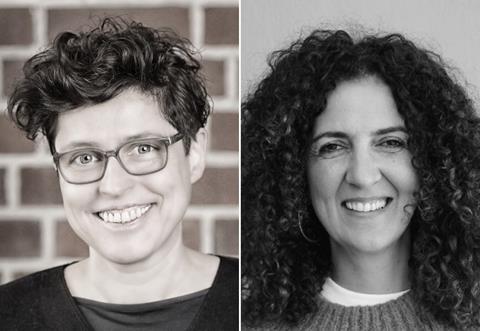
The 32st Filmfest Hamburg opens today (September 26) with Louise Courvoisier’s Cannes prize-winner Holy Cow and closes with Pedro Almodovar’s Golden Lion-winner The Room Next Door.
Filmfest Hamburg director Malika Rabahallah and director of programming Kathrin Kohlstedde talk Screen through this year’s programme.
Rabahallah also reflects on her first year at the helm of the festival, having previously worked as head of the funding department at Hamburg and Schleswig-Holstein’s regional film fund MOIN (Moving Images North).
Malika, what has it been like moving from the film fund to become the director of a film festival?
Malika Rabahallah: It was an exciting change, although I had of course known the film festival before, but only from the outside as a guest and occasionally as a presenter. For me, the Filmfest is not just about watching films, but also about creating more networks within the city. To do this, you need new partners like cultural institutions and sponsors because I want the Filmfest to be more strongly anchored locally.
How has the international film industry reacted to your appointment?
MR: I have to admit that I was a bit overwhelmed by the extremely positive response when [my appointment] was announced last year in Cannes. It was a great honour, but now I have to deliver the goods!
What were the main challenges you faced when preparing this year’s edition?
MR: I only started on January 2 and those nine months were the biggest challenge for me because you have such a short preparation time and have to be quick in getting to grips with the workings of the festival. But the Filmfest’s biggest asset is the colleagues who have been working here for years and have fantastic expertise, so I was able to rely on a tried and tested team
What thematic and aesthetic characteristics stand out in this year’s line-up?
Kathrin Kohlstedde: US cinema is now well represented again in the programme after there was a lull for a while in classic US indie films coming through. For example, we have two films dealing with Donald Trump in the form of fiction [The Apprentice] and as a documentary [Homegrown] - and the timing there is perfect coming just ahead of the US elections.
And we also have animation for adults - one of Malika’s hobby horses - with screenings of The Wild Robot and The Most Precious of Cargoes by Michel Hazanavicius.
Another interesting development this year is that we have several films by female directors dealing with the theme of genre, including the UK’s Alice Lowe with Timestalker, Emma Benestan’s Animale and Carly May Borgstrom’s Spirit In The Blood which will have its world premiere in Hamburg.
We also attach great importance to discovering filmmakers from the very beginning of their careers and then accompanying them on their journey. For example, Magnus von Horn and Sean Baker showed their first and second films in Hamburg and they are now both back with their latest features [The Girl With The Needle and Anora].
Have you made any changes in your first edition to the structure of the Filmfest? Did you introduce any new sections to the film programme?
MR: I didn’t make any changes because I like the way the sections are structured. My vision is to have a festival for everyone and not just for cineastes, so we have expanded the “Filmfest ums Eck” initiative and now have a total of nine cinemas participating from Blankenese through to the Hafencity. In addition, we introduced the Free-For-All-Day on October 3 because I think that there are a lot of people in Hamburg who have never had the pleasure of visiting the Filmfest. We have a veritable potpourri of films where you’re sure to find something that you’ll find interesting. We are subtitling many of these films to make the access easier and working with various institutions who can contact their people directly and distribute the tickets.
Why did you choose Pia Marais and Joshua Oppenheimer for this year’s ‘Contemporary Focus in Cinema’?
KK: Both of them have strong signature styles as filmmakers. It’s fascinating to see someone from the documentary field like Joshua making a fictional film like The End, and Pia Marais is one of the few German filmmakers who has an international reputation whereas she is really only known to a small group of cineastes in Germany.
Will this be the first time that two filmmakers are being presented with the Douglas Sirk Award in the same year - and what makes Andrea Arnold and Jacques Audiard the right fit for this honour?
MR: We were so bowled over after seeing Emilia Pérez and Bird. They are both such strong European filmmakers and can already look back on impressive careers. I felt that they both deserve the award and, since it’s my first year as festival director, I thought “Why not? Let’s make it happen! ”
KK: And the second Albert Wiederspiel Award, which goes to people from countries and regions where it is becoming increasingly difficult to make films, will be presented this year to the Georgian director Dea Kulumbegashvili whose film April won the Special Jury Prize in Venice.
What are your main goals for the Filmfest’s future development?
MR: If you were to ask me for my resumé after five years as director, I would have to say that I want the Filmfest to have been firmly established as an event throughout the city, that we have reached all of the people in Hamburg and have made many of them happy! Another goal would be to ensure that the film industry knows that it has a place to come to each year at the end of September/beginning of October where people can come together and attend an inspiring industry programme.
What’s more, my biggest wish would be that we have a festival centre so that everyone can meet each other in a beautiful location!
















![[L-R]: Amanda Villavieja, Laia Casanovas, Yasmina Praderas](https://d1nslcd7m2225b.cloudfront.net/Pictures/274x183/6/4/1/1471641_pxl_20251224_103354743_618426_crop.jpg)








No comments yet